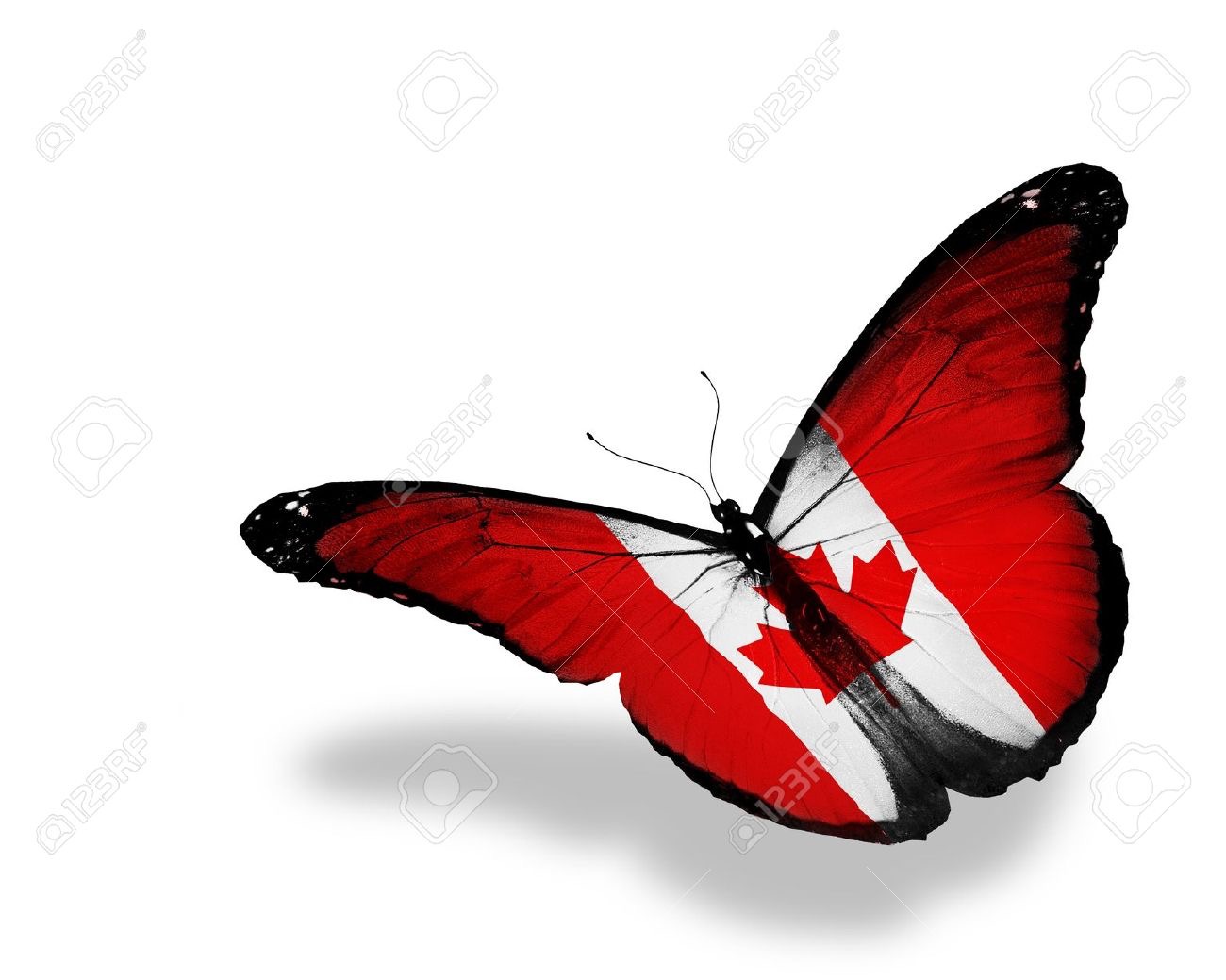I am Canadian and I was a refugee
The situation with the Syrians is bringing me back to memory lane. Our family was one the refugees called the “boat people” fleeing Vietnam. We were Chinese living in Vietnam and because of the war between China and Vietnam, we were persecuted. We left our homes with nothing but the clothes on our back and a little bit of gold. We didn’t know what to do but to go home to China, I mean, we are Chinese.
We didn’t really belong in China either, but we were grateful that they took us in. The Chinese government put us in a communal farm. Our family of 5 were housed in a little 300 square foot compound. My mom was assigned to teach in the communal farm school and my dad was assigned to work in the tea farm. Life was extremely difficult and my father’s work was extremely hard. My parents were paid a total of $30 per month, but it costed $1.5 to buy a pound of pork. It was a treat to have meat for dinner. My parents knew that they didn’t want this to be our life, and they needed to find a solution.
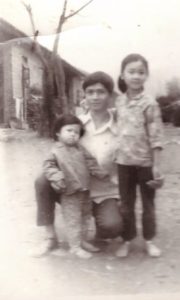
Figure 1. My youngest brother, Steven, Dad and I standing in front of our compound at the communal farm in China.
My parents learned that people were leaving Vietnam by boat and going to a Hong Kong refugee camp so that they could have an opportunity to create a better life for their families and we could have freedom! My parents held on to the possibility that we could leave mainland China and go to Hong Kong for greater freedom (Hong Kong was not yet part of China). So they gathered all the gold they had and bought us a ticket on the boat to freedom. We left our Chinese communal farm in the middle of the night with the hope that by morning, it would be too late for the officials to stop us. I remember walking in the dark through long grass that was taller than me. I was so scared. I had to run to keep up with my parents and the group of other people with us. My parents carried my two younger brothers,Trevor and Steven, then 5 and 2 years old. I was told by my parents that I needed to keep up or I will be left behind. I was so terrified of being left behind that even today if someone says anything like that to me, it triggers huge fear and anxiety in me.
We walked through the night and arrived in Ping Sai, a small town by the sea. We had to hide in a dilapidated old house so the authorities couldn’t see us. When night fell, we walked to the shore to catch our boat to freedom. To our horror, the little fishing boat was not seaworthy. Because we had given them all of our savings we had no choice but to go on the boat. We ended up in a Chinese jail instead – because the water patrol spotted us. I have always been grateful for that jail because we would of died in the sea if we had not been caught. (When we see the Syrians taking such dreadful chances in useless boats – we understand the choice and the terror.)
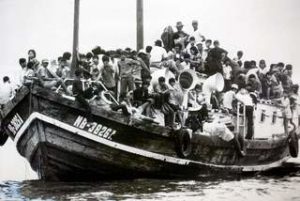
Figure 2. A typical boat stacked with refugees.
We spent only one night in jail and then we were sent back to our exhausting communal farm. Our savings were all gone but my parents didn’t give up on their dream of freedom and a better life for our family. They saved all that they could, borrowed from whomever they could and sent me to the market with our neighbours to sell anything we had to raise enough money to buy a spot in another boat for our family. When given no option, we somehow do what we need to do. Now, I can’t imagine being only 7 years old and going to the market by myself to sell things. I am so grateful that we live in Canada and my children will never need to go through living from hand to mouth.
The planned seven hour boat ride that we purchased became a seven day ordeal. We were attacked by pirates who took all of the little we had left. We encountered a storm and were shipwrecked. Because of the storm, the sea was extremely rough and we could not get close to the shore. I remember being thrown into the water where my dad was supposedly ready to catch me, but he was busy saving another child and I almost drowned. (I remember going swimming when I was a new Canadian and we were going down the slide. When when I went into the water I had flashback of that memory… and thought I was drowning again!.) When we finally got to dry land, we had no food. We didn’t budget for the journey to be that long! On shore, we had to scrounge for seaweed and my mom had to beg the other people to spare us a little bit of rice. I remember licking berries for the salt from the sea water.
We ended up stranded on that island for a week before the storm calmed and we were able to continue our journey. Unfortunately the boat had taken a beating from the storm. There were holes in the boat and I remember people taking whatever blankets and other materials we we could find and stuffing the holes. The adult men bailed water. We were piled on top of each other because we had more than 174 people on our poor fishing boat. People were throwing up everywhere, the crush was horrid and every square inch was packed with people. We were like sardines! We could only sit-up because there was not enough room to lay down. You cannot imagine what it smelled like? I remember being both wet and cold from the rain thrashing at us from the storm.
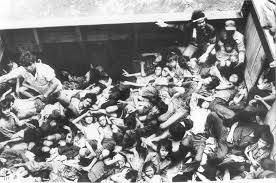 Figure 3. This photo of refugee packed like sardines, is a reasonable facsimile of our situation, although our boat was smaller. Nobody on our boat had a camera.
Figure 3. This photo of refugee packed like sardines, is a reasonable facsimile of our situation, although our boat was smaller. Nobody on our boat had a camera.
We were at sea in very rough water and could see many dead bodies floating around us and we knew that our boat was falling apart and would surely sink. At that terrifying moment a friend of my parents, Gai Lau (he now lives in Switzerland) who was a very strong swimmer, volunteered to swim for help. It is a blessing that he found a couple of fishermen and negotiated a deal for them to tow us close to patrolled water. We ended up in Macau. When asked where we were going, we told them Hong Kong. They saw that our boat wasn’t doing well and towed us to shore so they can pump water out of the boat for us to continue our journey. As they were pumping water, our boat sank!
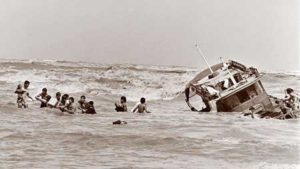 Figure 4. Capsizing boats like this were common sights in the sea.
Figure 4. Capsizing boats like this were common sights in the sea.
We ended up staying in a refugee camp. As it turned out we were extremely lucky that we were in the Macau refugee camp instead of Hong Kong. We had a relatively decent camp life. In Hong Kong, the refugees were treated worse than prisoners. There were so many people in our Macau camp! There were rows and rows of warehouses with rows and rows of bunks lined up inside. Our family was assigned to a bunk which was the size of a king size bed. We were in the lower bunk. We ate and slept and stored all our meager belongings in the bunk. We were lucky that we could do some piece work for the local silk flower factory. We would earn $2 a day assembling the silk flowers. We were one of the lucky ones and only had to stayed in the refugee camp for nine months (September 1979 to May 1980).
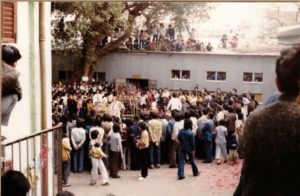 Figure 5. Firecrackers being lit to celebrate Chinese New Year at the refugee camp in Macau.
Figure 5. Firecrackers being lit to celebrate Chinese New Year at the refugee camp in Macau.
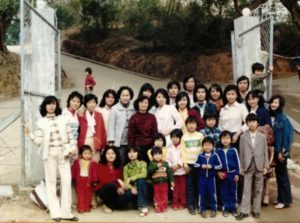 Figure 6. This is a group picture of our friends and family at the gate of the Macau refugee camp. We came on the same boat with my aunt Willow and her family. At the refugee camp, we found some of my parents cousins.
Figure 6. This is a group picture of our friends and family at the gate of the Macau refugee camp. We came on the same boat with my aunt Willow and her family. At the refugee camp, we found some of my parents cousins.
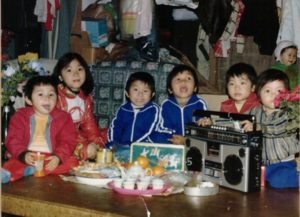 Figure 7. Sporting our new clothes on Chinese New Year on our bunk in the refugee camp. All our belongs were stored on the bunk. My cousin Phong is beside me on the left, then to my right is my cousin Cam, my brother Trevor, a cousin whose name I forget and my brother Steven.
Figure 7. Sporting our new clothes on Chinese New Year on our bunk in the refugee camp. All our belongs were stored on the bunk. My cousin Phong is beside me on the left, then to my right is my cousin Cam, my brother Trevor, a cousin whose name I forget and my brother Steven.
While in Macau we learned that my uncle had ended up in Calgary from the Hong Kong refugee camp. So we chose to go to Calgary. We are so grateful that five people (an anonymous sponsor, Dr. & Mrs. James Hunt and Gary & Audrey Farber) sponsored us to Canada. We had never met them before, they only knew us from a photograph that the government took of us. Because of their very big hearts, they saved our family. We are so blessed. I know that God was looking after us. Because of these kind hearted people, we had an opportunity for a better life. They took us into their homes. The community donated furniture, pots and pans to help settled us into our own place. I am forever grateful for the support of total strangers. They help us because it was the right thing to do, the humanitarian thing to do, not expecting anything in return.
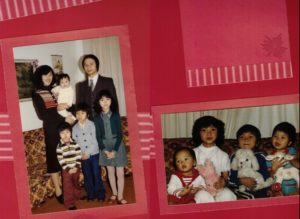 Figure 8. The first photography is our complete family with a new addition, my baby sister, Linda, born two months after we arrived in Calgary. The second photo is with my little cousin who arrived to Calgary before us and my two brothers to the right. All the furniture and clothes we had were generously donated by the community.
Figure 8. The first photography is our complete family with a new addition, my baby sister, Linda, born two months after we arrived in Calgary. The second photo is with my little cousin who arrived to Calgary before us and my two brothers to the right. All the furniture and clothes we had were generously donated by the community.
I am torn thinking about the Syrian refugees. There is so much talk about the terrorist trying to come into our country. Are we going to sacrifice so many families with a chance that there may be a terrorist amongst them? They are victims, just like we were. How can we leave them in those dehumanizing camps? The Vietnamese “boat people” refugees are contributing citizens of this country. My parents worked two jobs and were part of the labour force that built Calgary. We never went on welfare. Now, my brothers, sister, cousins and friends are all professionals or business owners contributing to our society. We are all taxpayers, not a burden to society. We volunteer in both local and global communities. We are part of the force that is building a great Canada.
We can give the Syrian families a chance for a better life. All people deserve to live a life of freedom from persecution! They deserve to live a free life, just like you and I. Bringing them to Canada is the humanitarian thing to do. There are two primary choices in life, to accept conditions as they exist, or accept the responsibility for changing them. I choose to accept the responsibility to change them! What do you choose?

